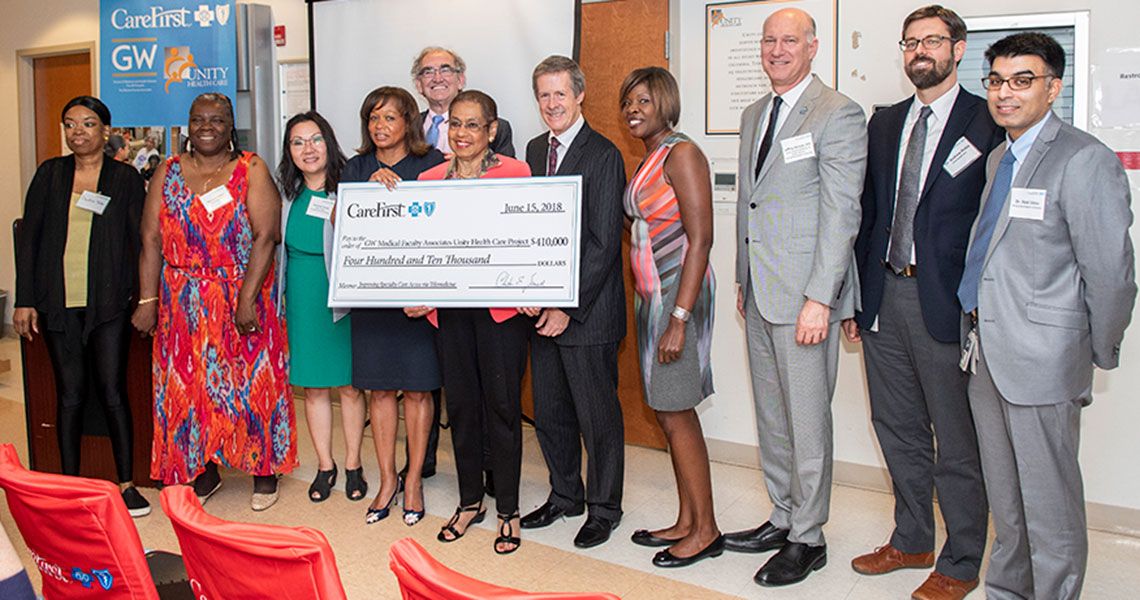Diabetes had always plagued Theresa Aiken’s family; she had watched her mother struggle with the disease, and she found herself fighting to keep her own sugar levels down. Then along came Unity Health Care (Unity) and the George Washington University’s (GW) telemedicine program.
“I had the opportunity my mother didn’t have,” Aiken said. “I could see my doctor face-to-face [on the screen] … and meeting her was the best thing that ever happened to me.”
The innovative program, which uses technology to bring specialty care to underserved communities, such as those in Wards 7 and 8 in Washington, D.C., started two years ago. GW received a $410,000 grant from CareFirst BlueCross BlueShield, the region’s largest not-for-profit health insurer, and joined forces with Unity’s Anacostia site, a union that was celebrated during a check presentation ceremony in early June.
“We’re taking medicine to where it has never been before, and that’s what excites me about what’s happening today,” said Congresswoman Eleanor Holmes Norton, D-D.C.
Telemedicine has largely been thought of as a solution to rural or remote health care, added Vincent C. Gray, D.C. Ward 7 councilmember, but it’s a “tool that should be available to everyone.” Providing that kind of service — and outreach to the community — is integral to the missions of the GW Medical Faculty Associates and the GW School of Medicine and Health Sciences (SMHS), which have provided physicians for the program.
“Our challenge is to eliminate health disparities in the District and the region,” said Jeffrey S. Akman, MD ’81, RESD ’85, vice president for health affairs and Walter A. Bloedorn Professor of Administrative Medicine, and dean of SMHS.
Housed within SMHS, for example, are the Rodham Institute, which uses education to achieve health equity in the District, and the Ron and Joy Paul Kidney Center, established by two-time kidney recipient Ron Paul to raise awareness on kidney disease diagnosis, treatment, and donation.
The telemedicine program, which improves access for diabetes, hypertension, and renal disease patients, streamlines the process from the initial consultation to specialty referral, explained Neal Sikka, MD, co-chief of the Section of Innovative Practice and associate professor of emergency medicine at SMHS.
“Technology-enabled care requires careful planning, and it requires commitment from the health care providers and patients to make it work,” he said. “We … are helping patients today, and the knowledge that we gain from this program will help us leverage improving and enhancing technology and care.”
In Aiken’s case, she saw her A1C, or blood glucose levels, drop from a precipitously high 12.2 to prediabetes levels around 6.3, and her blood sugar, which used to take hours, if not days to lower, now hovers within a healthy 80 to 120 range.
Another patient, Dedra Tate, likewise saw her diabetes controlled, with help from Nicole Ehrhardt, MD, assistant professor of medicine at SMHS, who also treats Aiken, and Andrew Robie, MD, clinical instructor of medicine at SMHS and chief medical information officer at Unity.
“Telemedicine has been outstanding … I’m so happy you two docs are in my life,” she said, adding that her A1C went from just over 9 to 7.4. She’s also lost weight, going from a size 16 to a 10. “I am grateful to be part of this [program]. You have no idea how you’ve helped me change my life.”



